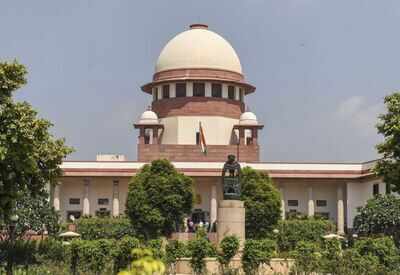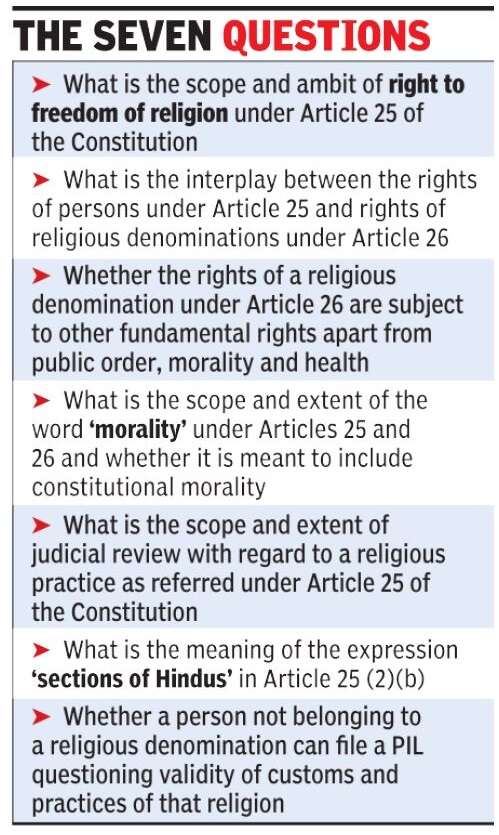
NEW DELHI: For the first time in 70 years, the SC on Monday decided to take up the sensitive task of defining the scope of right to freedom of religion guaranteed under Article 25.
A bench of CJI S A Bobde and Justices R Banumathi, Ashok Bhushan, L Nageswara Rao, Mohan M Shantanagoudar, S Abdul Nazeer, R Subhash Reddy, B R Gavai and Surya Kant framed seven questions on fundamental right to religion and its interplay with right of every religious denomination to establish and manage religious institutions. It will also decide whether a person, not belonging to a religious denomination, can file a PIL questioning validity of practices of that religion.
In the process, SC rejected resistance from lawyers led by senior advocate Fali S Nariman, who argued against SC undertaking the exercise of laying down guidelines for courts to deal with cases involving a clash between faith and fundamental rights.
Nariman had argued that the issues arose in petitions seeking review of the SC's judgment allowing the entry of women of all ages into the Sabarimala Ayyappa temple and a five-judge bench could not have in a review jurisdiction referred unconnected religious customs - curbs on entry of women into mosques, entry of Parsi women married outside the community into agiyaris and practice of female genital mutilation among Dawoodi Bohras - to a larger bench. The court, however, agreed with Solicitor General Tushar Mehta and said, "We hold that this court can refer questions of law to a larger bench in a review petition."

Apart from defining the ambit of right to rel igion, and examining the implications of Articles 25 and 26, the SC will decide whether a person, not belonging to a religious denomination, can file a PIL questioning validity of customs and practices of that religion. Article 25, while guaranteeing freedom of conscience and free profession, practise and propagation of religion, subjects this to "public order, morality and health". It also allows the government to regulate or restrict by a law the economic, financial, political and other secular activities associated with religious practices. It also allows the government to pass a law to provide social welfare and reform or throw open public religious institutions belonging to Hindus, Jains, Sikhs and Buddhists to all classes of persons belonging to these religious denominations.
Article 26, guarantees right of every religious denomination to establish and manage religious institutions subject again to "public order, morality and health". Arguments will be opened by former attorney general K Parasaran, who had defended the ban on entry of women in the age group of 10-50 years into the Sabarimala temple.
A bench of CJI S A Bobde and Justices R Banumathi, Ashok Bhushan, L Nageswara Rao, Mohan M Shantanagoudar, S Abdul Nazeer, R Subhash Reddy, B R Gavai and Surya Kant framed seven questions on fundamental right to religion and its interplay with right of every religious denomination to establish and manage religious institutions. It will also decide whether a person, not belonging to a religious denomination, can file a PIL questioning validity of practices of that religion.
In the process, SC rejected resistance from lawyers led by senior advocate Fali S Nariman, who argued against SC undertaking the exercise of laying down guidelines for courts to deal with cases involving a clash between faith and fundamental rights.
Nariman had argued that the issues arose in petitions seeking review of the SC's judgment allowing the entry of women of all ages into the Sabarimala Ayyappa temple and a five-judge bench could not have in a review jurisdiction referred unconnected religious customs - curbs on entry of women into mosques, entry of Parsi women married outside the community into agiyaris and practice of female genital mutilation among Dawoodi Bohras - to a larger bench. The court, however, agreed with Solicitor General Tushar Mehta and said, "We hold that this court can refer questions of law to a larger bench in a review petition."

Apart from defining the ambit of right to rel igion, and examining the implications of Articles 25 and 26, the SC will decide whether a person, not belonging to a religious denomination, can file a PIL questioning validity of customs and practices of that religion. Article 25, while guaranteeing freedom of conscience and free profession, practise and propagation of religion, subjects this to "public order, morality and health". It also allows the government to regulate or restrict by a law the economic, financial, political and other secular activities associated with religious practices. It also allows the government to pass a law to provide social welfare and reform or throw open public religious institutions belonging to Hindus, Jains, Sikhs and Buddhists to all classes of persons belonging to these religious denominations.
Article 26, guarantees right of every religious denomination to establish and manage religious institutions subject again to "public order, morality and health". Arguments will be opened by former attorney general K Parasaran, who had defended the ban on entry of women in the age group of 10-50 years into the Sabarimala temple.
Download The Times of India News App for Latest India News.
more from times of india news
Get the app









